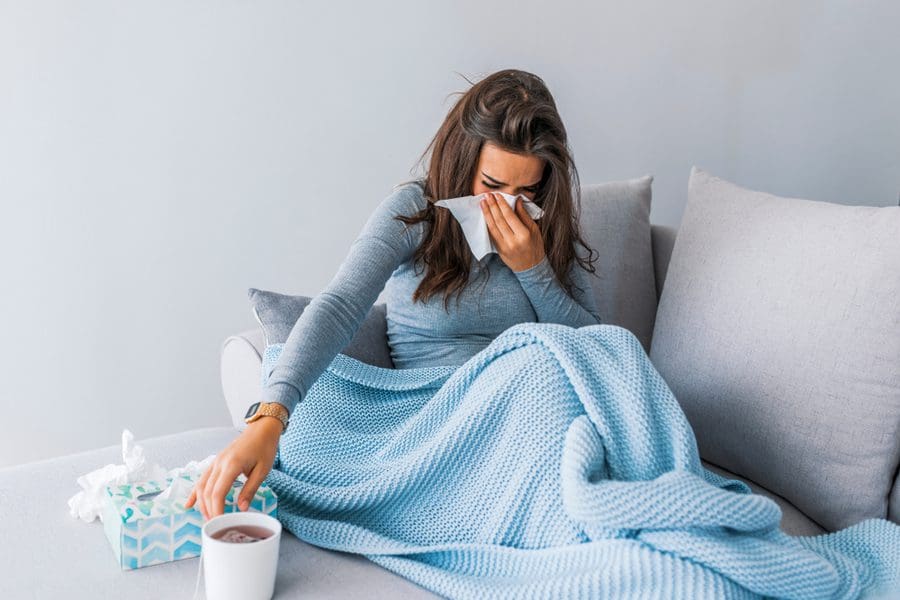Most people infected with the coronavirus won’t need hospitalization but will be convalescing at home. Having the right supplies on hand can give peace of mind to anyone who must take care of themselves or nurse family members if Covid-19 should strike. Collect basic medical supplies and add essential food and beverages to your pantry for an emergency Covid-19 kit. You and the people you love will be better prepared to ride out this outbreak.
Safety essentials call for donning a mask and gloves in public and when you are caring for a patient who is sick with Covid-19. Shortages have made simple surgical masks hard to come by, and even hardware-store project masks are in extremely short supply. Improvise with a bandana or scarf, and make sure to cover your nose, mouth and chin. The Internet offers instructions for no-sew and DIY masks.
Wear latex or nitrile rubber gloves while in a sick room or doing laundry for a quarantined patient. Wash your hands frequently with soap and water for 20 seconds. Scrub between your fingers and up along your wrists. Take hand sanitizer along with you when you won’t be able to use soap and water. Use disposable tissues to cover your cough or sneeze. Disinfecting wipes are another rare find these days, but shelves still carry cleaning supplies such as household cleaners, bleach, disinfectants and paper towels.
Doctors recommend these items you can assemble for an ideal Covid-19 home-care kit.
MEDICAL SUPPLIES
Over-the-counter cold medicines
Keep a stash of the regular cold remedies you rely on. If your child is younger than 18, get the staples you normally use in treating sicknesses such as the cold and flu.
Tylenol or acetaminophen
In addition to the adult formulas, stock up on the children’s or infant’s versions of Tylenol or acetaminophen.
Cough drops
For younger children who are suffering from a sore throat, try warm tea with honey if you think cough drops might be a choking hazard.
Daily multivitamins and vitamin C
Saline nasal spray
Saline sprays can help thin any mucus in the nose and permit easier breathing when you are congested. These sprays contain a small amount of salt and sterilized water but no medication. They have no side effects.
Thermometer
A really good thermometer should read your temperature accurately and deliver results quickly in a display that’s easy to read. Most thermometers will give you an accurate reading. With supplies depleted during the coronavirus outbreak, any digital thermometer in stock now at a pharmacy should be okay. Look for the Vicks ComfortFlex, the Vicks RapidRead Digital or the Mabis Digital.
At-home pulse oximeter
This indicates how well the lungs are functioning by measuring heart rate and blood oxygen levels. Some doctors recommend this device that clips on the finger for your Covid-19 emergency kit.
However, Wirecutter quotes Dr. Albert Rizzo, chief medical officer for the American Lung Association as saying a portable oximeter is not a necessary tool for monitoring everyone’s health. “A drop in oxygen level in somebody with COVID-19 is one of the criteria to think about getting more care than staying at home, but monitoring your symptoms—cough, shortness of breath, chest discomfort—those are the main things,” according to Dr. Rizzo.
If a doctor advises one for you, look for FDA-cleared fingertip pulse oximeters, which are required to have ±3 percent accuracy. You can search for oximeter in medical devices in the FDA’s 510(k) Premarket Notification Database.
FOOD AND DRINK
Electrolyte-replacement drinks
Pedialyte, coconut water, milk, watermelon water and other fruit juices, smoothies, electrolyte-infused water, electrolyte powder, sports drinks such as Gatorade. Replenishing fluids is important because Covid-19 can cause gastrointestinal distress, diarrhea and dehydration, and dehydration can make a fever worse.
Sports drinks such as Gatorade tend to be loaded with sugar, and sugar can make diarrhea worse. Dilute popular sports drinks in half with water for both children and adults. Doctors recommend against sugar-free beverages sweetened with sugar substitutes, because artificial sweeteners also can make gastrointestinal problems worse.
Chicken soup
Don’t overlook your Grandma’s cure-all.
Apples and bananas
Pectin-rich foods can ease the symptoms of diarrhea.
Honey
Add to tea and soothe a sore throat.
Dill, ginger and oregano
Add these to soups for their antiviral properties.






